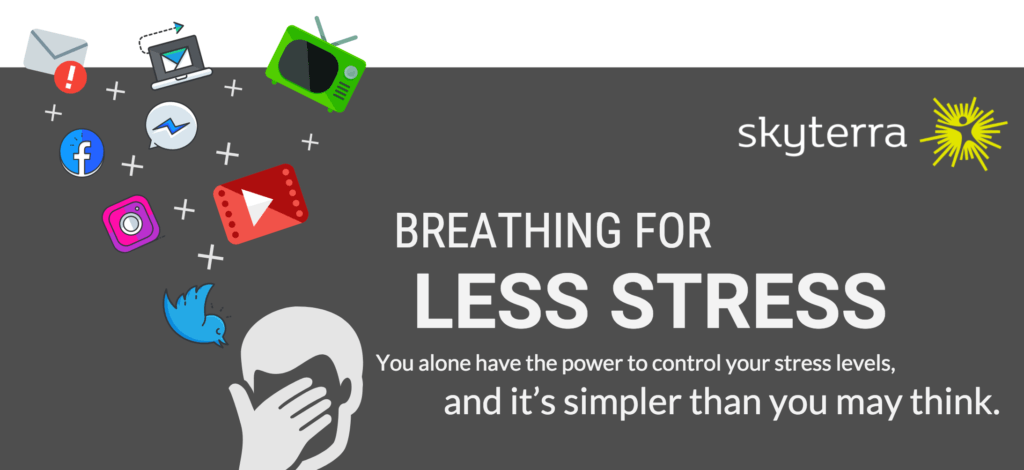Breathing for Less Stress


You alone have the power to control your stress levels, and it’s simpler than you may think. Step back and take a look at your schedule – are you leaving time to breathe? With work and family commitments, self-care can seem like an unattainable goal or even an indulgence. Our bodies were not made to sustain this lifestyle.
Stress has a sneaky way of building up and expressing itself in different ways through both short term and long term symptoms. Short term symptoms of stress include headaches, low immunity, muscle tension, fatigue, upset stomach, chest pain and difficulty sleeping. If not addressed, long term health complications like high blood pressure, hypertension, heart disease, insomnia, obesity and diabetes can develop from prolonged periods of stress. Only you can take charge of your health! Listen to what your body is trying to tell you and respond by making changes to your lifestyle.
Kate Hannon, Director of Integrated Wellbeing at Skyterra Wellness explains our bodies’ reaction to stress, “Let’s look at the Central Nervous System (CNS). It has two basic functions. It will either be in the Sympathetic Response (stress state of fight or flight) or the Parasympathetic Response (relaxed, optimal digestion and calm). This is also known as your Relaxation Response. When stressed, the heart rate increases, muscles tense, blood rushes to the muscles.” If left unchecked, this response can surface in a number of the stress symptoms that were previously listed. Kate suggests an alternative, “We can initiate a different response, we can actually control this through slow, deep breaths. And the opposite effects happen in the body, resulting in a calm state both physically and emotionally.”
Belly breathing isn’t just for a select few – everyone can learn to master this skill. “The American Institute of Stress noticed that people who did belly-breathing for 20-30 minutes every day had significantly less anxiety and depression,” Kate advises. Short increments of deep breaths are helpful, too – “I believe practicing 2-3 minutes a day will make a difference for you. Start wherever you are.”
Stress management looks different for each individual. Deep breathing is a universally proven and encouraged method of de-stressing your body from the inside out. By incorporating a daily practice of deep breathing, you will begin to see improvements in your demeanor and stress levels. Follow these tips for a well-rounded practice of deep breathing:
Conscious Breathing:
Start simply, with an awareness of your breath as it moves through the body. Kate advises beginners to start with this method of conscious breathing – “Notice the inhale and the exhale and where you predominantly feel it in the body. Perhaps the nose, chest or belly. Do not try to change it or control it in any way, simply noticing the natural rhythm. Let this be easy.” The best part about this method is that it can be conducted anywhere – at your desk, in rush hour traffic, or at home. Start with 2-3 minutes at a time, and slowly build to a deeper, prolonged practice of mindfulness.
Mindfulness:
Mindfulness requires your presence in the moment. Leave your worries, anxieties, and racing thoughts behind and bring your best focus. Kate walks us through the underlying roots of our anxiety and how to mend it through mindfulness – “If you think where our anxiety and depression stem from, it’s from thinking about the past or the future. When we allow our breath to center us in this precise moment, we experience clarity and that tension of wanting things to be different than they are dissolves the more we practice. We see things for how they are.” The more frequent your sessions, the better. Commit to a practice of mindfulness each day! Over time, as you build on your practice, you’ll find that you are distracted less and that your focus is sharper.
Movement:
Get moving! Mindful movement through low impact exercises like walking can aid in stress management. As you stroll, do so in a calming environment like a park or hiking trail. Other activities, like talking to a close friend, unplugging from your digital devices for at least 30 minutes a day, or therapy can support your mindful lifestyle. If all that you remember to do is have a mindful moment each day, your life will be enriched.
In need of a lifestyle change? At Skyterra Wellness, we help our guests maximize their potential with wellness consultation. Our professional staff works with each individual to determine a path that best suits their priorities. This plan may include meal planning, fitness coaching, and overall guidance for total body wellness.